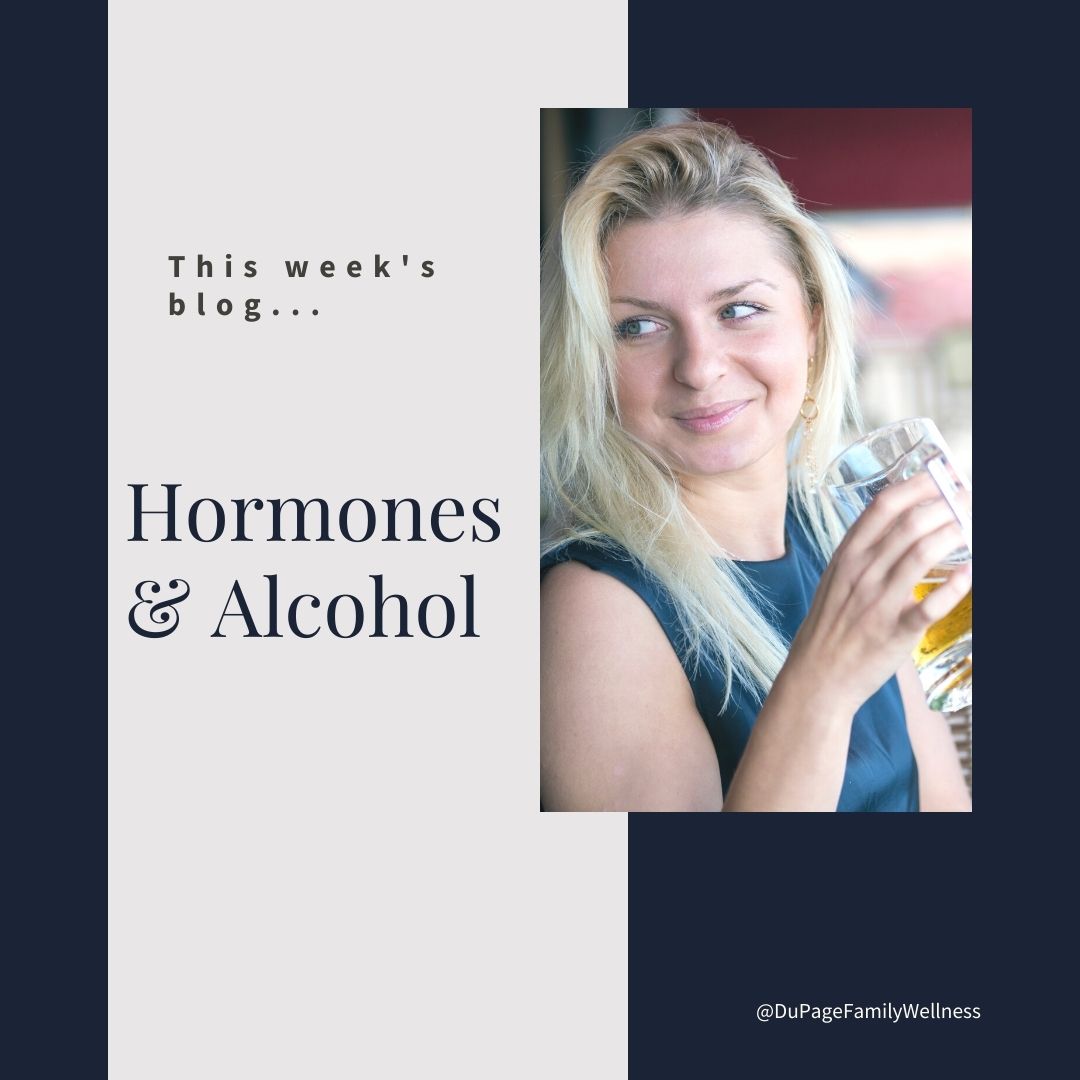 In the summer you may have visions of lounging by the pool with a drink in hand. While that isn’t always an option, a beer or glass of wine at the end of the day certainly is.
In the summer you may have visions of lounging by the pool with a drink in hand. While that isn’t always an option, a beer or glass of wine at the end of the day certainly is.
There is nothing wrong with an occasional drink. It can be a nice way to wind down or have fun with your friends.
At the same time, it’s good to understand the effects it has on our bodies. Once we do, we can make wise decisions on what and how much we drink.
Let’s take a look specifically at how it affects women in regard to our hormones.
What Are Hormones?
Hormones are chemical messengers within the body that are secreted by glands in the endocrine system. These messengers tell the tissue and organs in the body what to do.
The proper balance of hormones is crucial for both physical and mental health. When something happens to make one hormone increase the other hormones are affected.
It's like a delicate dance with some hormones following another's lead.
Alcohol and Hormones?
Alcohol has a complicated relationship with the balance of hormones within the body. It increases some hormone levels, which inversely lowers other hormone levels.
Let’s take a look at some of the specific ways moderate alcohol impacts this system.
- Estrogen - Alcohol has been found to raise the level of estrogen in the body. One of the reasons is because both alcohol and estrogen are processed in the liver. When the liver is busy handling alcohol, it prevents the liver from detoxing estrogen as efficiently. This results in a buildup of estrogen in the system.
- Cortisol - Moderate alcohol increases this stress hormone while suppressing the amount of melatonin the body produces by up to 20%. While you may expect alcohol to relax you and give you a good night’s sleep, research says that the opposite actually happens.
- Thyroid Hormones - The rise in estrogen we spoke about earlier prevents the thyroid from releasing the normal amount of hormones. In addition, the increase in stress hormones will make your body less effective in converting T4 into T3.
- Progesterone - Estrogen and progesterone have an inverse relationship. When estrogen levels rise due to alcohol consumption, progesterone will decrease.
- Insulin - Alcohol may hinder the body’s ability to process sugar in some people and increase issues with insulin resistance.
Implications for Women
When we understand the impact that alcohol has one our system, we can use this knowledge to make decisions about our alcohol consumption.
Consider your body and season of life. If you are already dealing with Polycystic Ovary Syndrome (PCOS) or other hormonal issues, you may choose to be more cautious with your alcohol intake than someone who is not struggling with it.
Another group that may choose caution, are women trying to conceive. Since proper hormone balance is crucial for conception, women with fertility issues may wish to limit their alcohol consumption especially during the week leading up to ovulation.
Please know that I am not saying alcohol is bad! It is a personal decision, and you won’t find any judgment here. I just want to present this knowledge to you so you can make an informed decision surrounding your alcohol intake.
Dr. Jamie
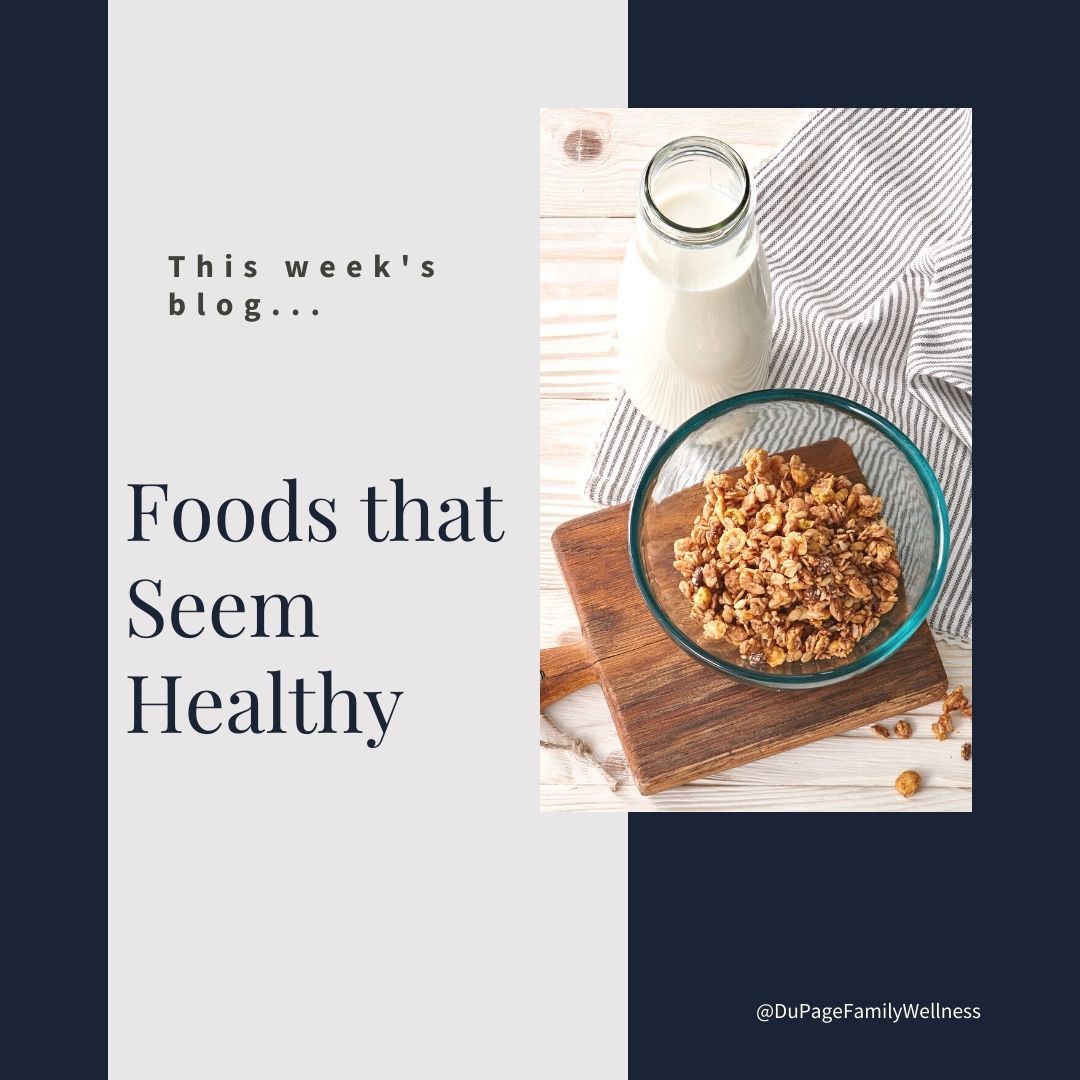 We’ve all heard it, eat fewer calories than you burn and you will lose weight. It sounds so reasonable, but is it really that straightforward? The short answer, is it’s NOT.
We’ve all heard it, eat fewer calories than you burn and you will lose weight. It sounds so reasonable, but is it really that straightforward? The short answer, is it’s NOT.
Trust me, I used to be a calorie counter too. I figured if I ate fewer calories than I burned, I’d lose weight! When it didn’t work, I was confused. My research led me to understand that it is much more complex than the calorie in calorie out myth.
Food is MUCH more than just a source of calories; it is information for our bodies! And our bodies are not simple scales, balancing calories in and calories out. Our bodies have many complex chemical systems that break down the food we eat and process each ingredient in a different way!
Armed with this information, I thought about the foods I used to buy because I thought they were healthy. Keep reading to find out what these foods are along with the reasons that I no longer buy them.
Food Marketing is Tricky
An important point to keep in mind is that food marketers are after their best interest, not yours. The truth is that their main concern is what helps their bottom line.
- Making the food as cheaply as possible.
- Making the food's shelf life as long as possible.
- Making the food addictive so we want to keep eating it and buying it.
Their goals are definitely different than mine. I don’t want the cheapest ingredients in my body. I actually want my food to go bad because if it will last on a shelf forever it must be full of chemicals to keep the bacteria away. And I certainly don’t want to be addicted to my food.
To make matters worse food companies throw in buzzwords like “gluten-free,” “low fat,” “heart healthy,'' and “all natural” to confuse us. This type of marketing makes us believe the foods are good for us even when they’re not.
Boca Burgers and Veggie Burgers
For years I believed that eating red meat was bad for me, so I turned to meat alternatives. The label showed that soy patties have less fat and less cholesterol than a beef burger, and I was sold.
But we don’t have to be afraid of fat! Research has found that cholesterol in the diet does not play a strong role in determining the body’s cholesterol levels. In fact, we need good healthy fats to survive.
We should, however, be cautious with any food product that has a long ingredient list, especially if it contains words you don’t recognize. A good rule of thumb is: "If you wouldn’t want to eat the ingredients plain, then why eat them all combined in a food-like product?”
A good grass-fed burger that comes from a healthy cow that was able to walk around and eat its natural diet while it was alive has only one ingredient: beef! It has important nutrients, and I’d choose that over meat alternatives any day!
Fruit flavored yogurt
I used to eat fruit-flavored yogurt every morning. I loved that it was only 80 calories. But now I look at it and see that it contains “natural and artificial flavors.” I mean, what does that even mean?
I don’t consume much dairy now, but when I do eat yogurt it will be PLAIN FULL FAT yogurt. The less processed the better.
When the milk came out of the cow it had fat in it. Wouldn’t you prefer to keep it that way? The fat is actually HELPFUL in keeping your blood sugar stable for longer periods of time without spiking. And if you want fruit-flavored yogurt, you can add your own real berries!
Read more ...
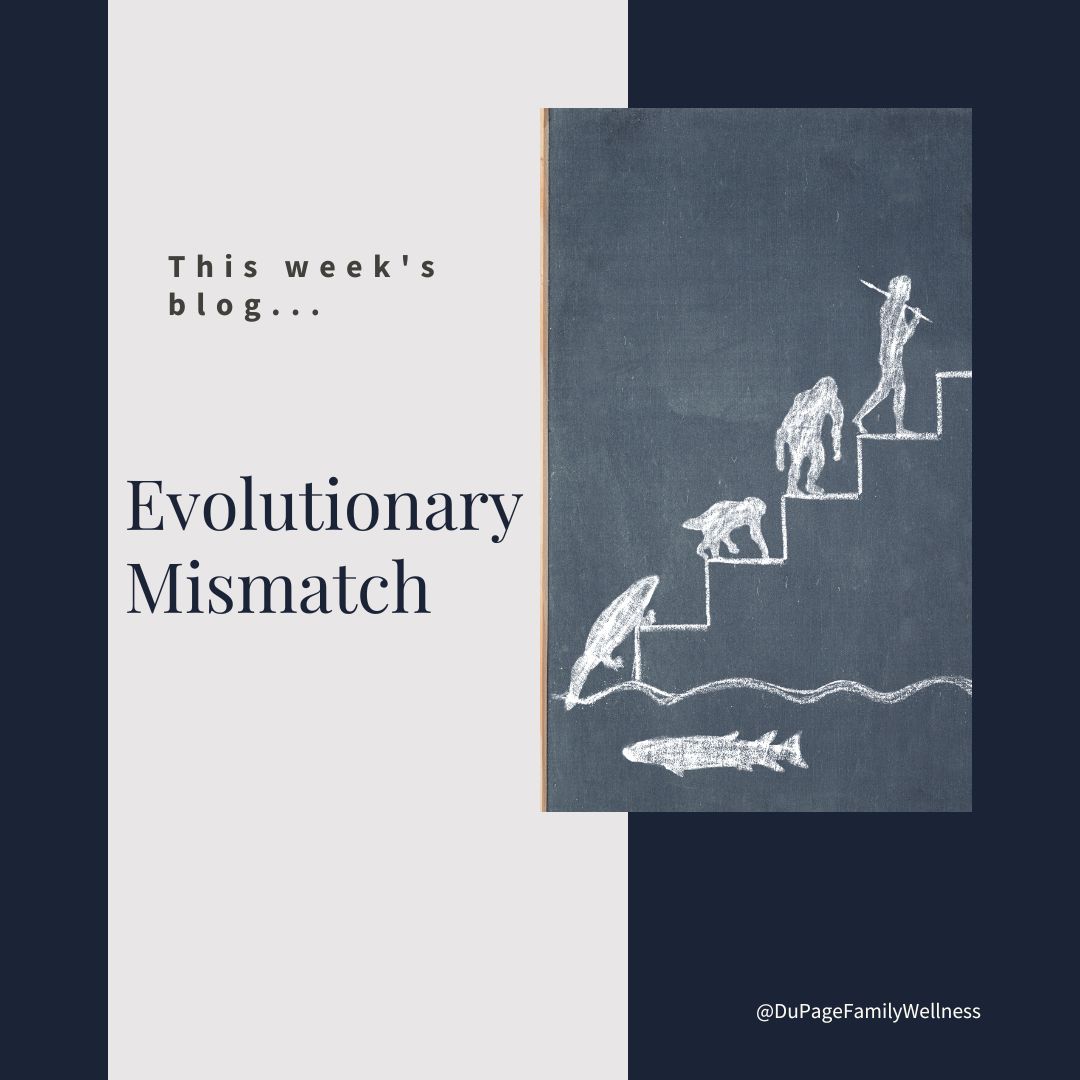 Have you ever thought about how our ancestors long ago lived compared to how we live today? And how our modern conveniences have changed the world we live in and what that means for you?
Have you ever thought about how our ancestors long ago lived compared to how we live today? And how our modern conveniences have changed the world we live in and what that means for you?
When you stop to think about it, the differences are drastic. We don’t move, eat, or sleep the same as people did thousands of years ago. Even our grandparents had a different life than those thousands of years ago, though they were much closer than we are today.
Let’s look at the impact that our current culture and environment have on our health and see what we can do to honor what our bodies have always needed.
Food, Movement, & Sleep for Our Ancestors
Thousands of years ago our ancestors were dependent on the land. They didn’t have any other source of food than that which they could provide for themselves.
As hunters and gatherers, they needed to move much of the time. They walked many miles to chase prey. They spent a lot of time gathering food from plant sources - berries, roots, etc. - but oftentimes food was scarce.
Even when they relaxed, they had to physically support their bodies, sitting on the ground or a bench made of logs. In general, movement didn’t need to be an intentional decision, it was simply built into their everyday life.
Our ancestors also tended to follow the rhythm of the sun. Since their light was limited to the sun, stars, and possibly a fire, they likely did not stay up to all hours of the night. Bright light in the morning and darkness at night supported a healthy circadian rhythm.
Read more ...
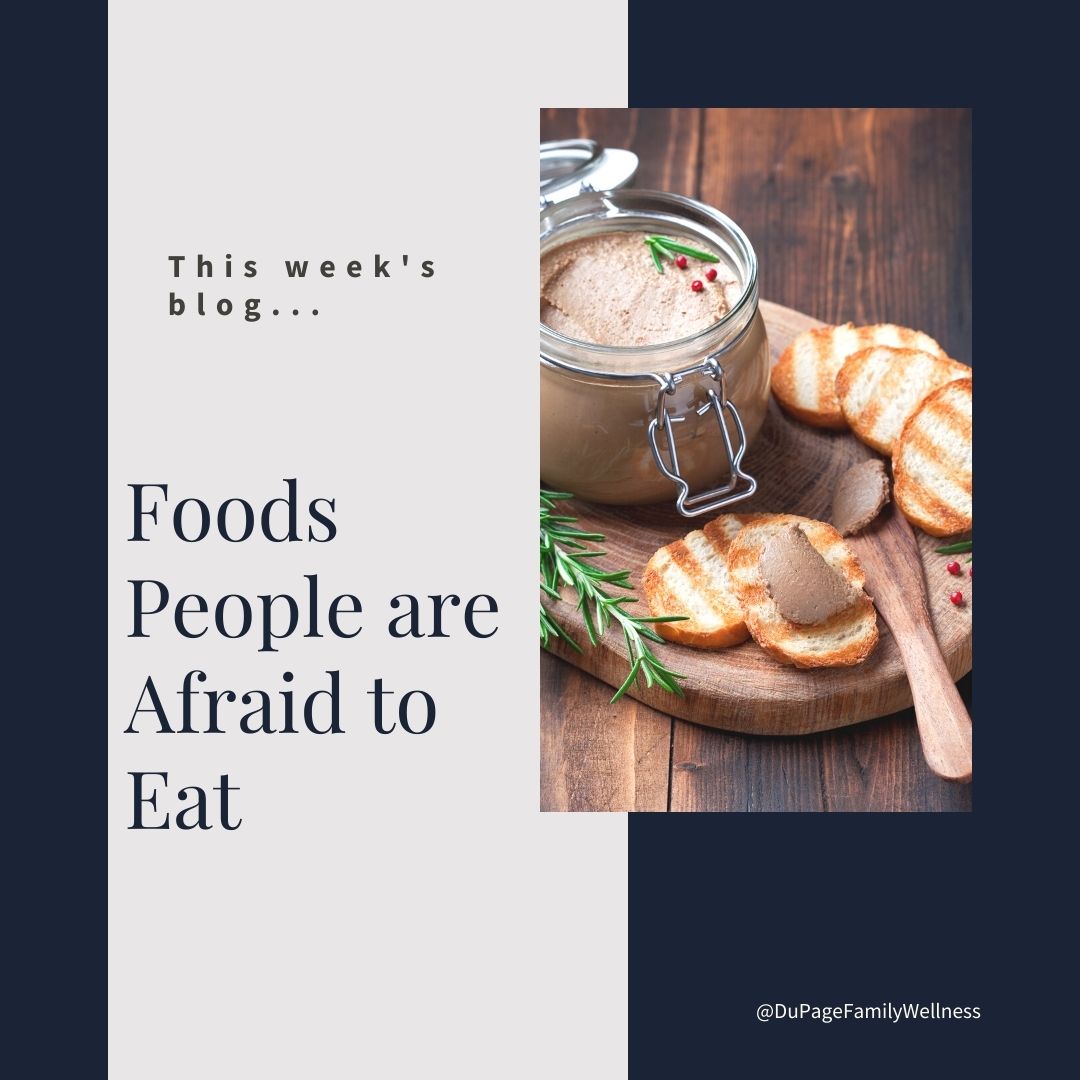 It’s not only kids that avoid certain foods. Many adults who don’t consider themselves picky eaters avoid certain foods as well.
It’s not only kids that avoid certain foods. Many adults who don’t consider themselves picky eaters avoid certain foods as well.
Some people are afraid to eat specific foods because they have been told they are unhealthy, while others think they will taste bad.
Let’s look at 5 foods that many people avoid and tear down the myths that surround them. You might be surprised that the following foods have many health benefits and actually taste good!
Red Meat
Many people think that red meat is unhealthy, raising your cholesterol and setting you up for heart disease. However current research shows this is not true.
According to Dr. Chris Kresser, “despite what you’ve heard, red meat is an extremely healthy and nutrient-dense addition to your plate. It’s a great source of vitamin B12, Vitamin d, Iron, Zinc, Magnesium, Copper, Cobalt, and more.”
For more information about the benefits of red meat check out his article Red Meat: The Food They Love to Hate or download his eBook The Truth About Red Meat.
Eggs
Eggs have gotten a bad reputation over the years. It makes me sad that so many people are afraid of cholesterol, because cholesterol in our diet is not the enemy!
Studies have shown that eating eggs does not affect blood cholesterol in 75% of the population and only modestly increases LDL and HDL cholesterol in the rest of the population. These studies have found that eating eggs does not increase the risk of heart disease.
To learn more about why your body actually needs cholesterol check out my blog post Bacon & Eggs: Healthy or Not.
Read more ...
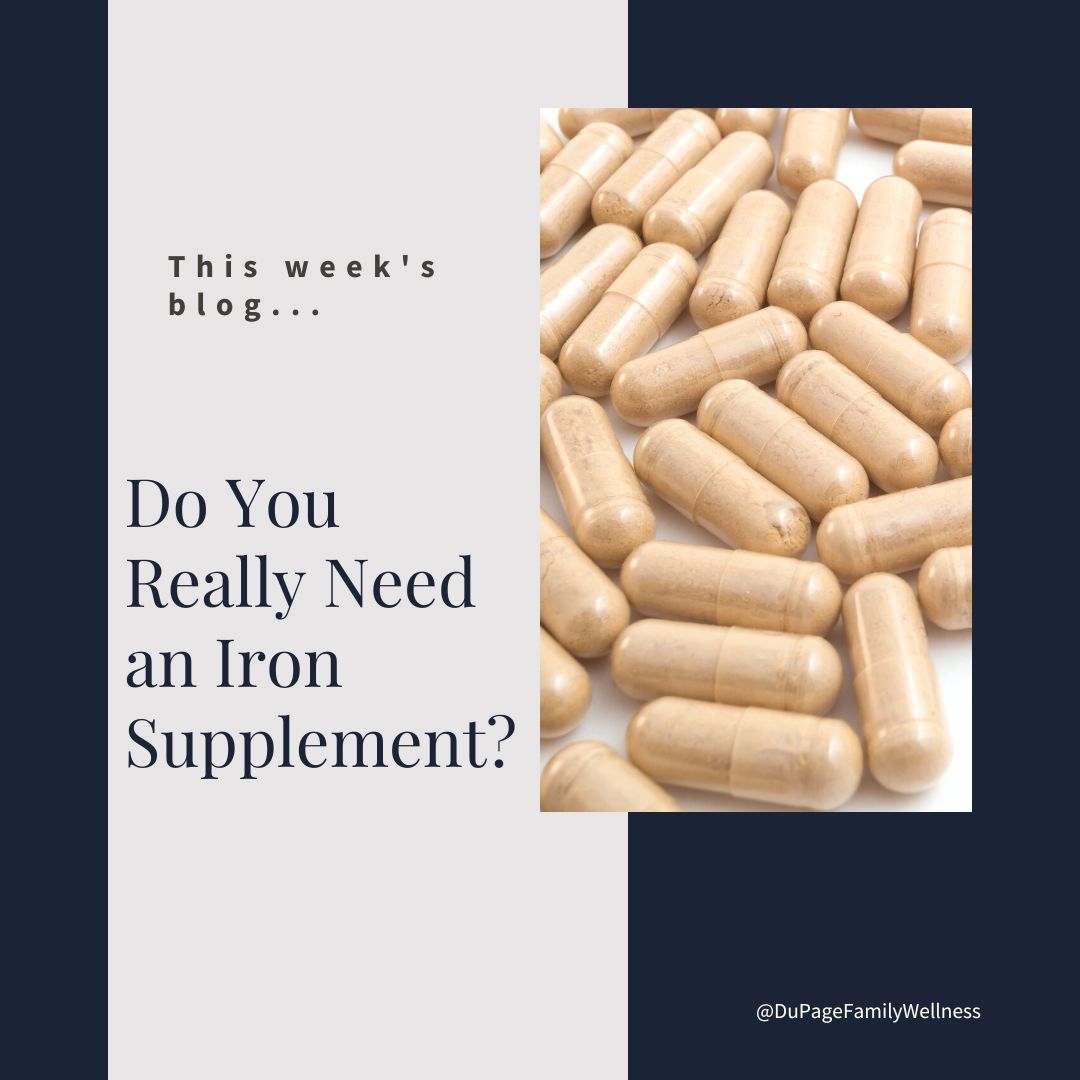
Do you feel tired all the time? If so, you may wonder if you are iron deficient. You may try to take iron supplements or go to the doctor for testing.
If you go to the doctor, they will probably use a blood test to check the ferritin levels in your body. Ferritin, a protein in iron, is often thought to be the best way to check for low iron or anemia.
But what if the iron is already in your cells, not in your blood? Are you really lacking iron in your body, or is the iron simply not working properly?
Let’s look at the purpose of iron and how it works in the body, so we can use this knowledge to make wise decisions about our iron consumption.
Iron’s Purpose & Movement in the Body
We cannot survive without oxygen circulating through our bodies. Iron's one responsibility is to carry oxygen in the body. Think of it as a waiter with a silver tray gracefully carrying the oxygen where it needs to go throughout the body.
The oxygen is carried on the iron through the body on red blood cells. You can think of the red blood cells as a moving sidewalk as you see in airports.
Once a red blood cell is not working anymore, the iron is able to keep circulating through the body by jumping on another red blood cell.
So, the waiters (iron) are riding on moving sidewalks (red blood cells) while carrying a tray (with oxygen on it). When one moving sidewalk (red blood cell) stops working, the waiter (iron) steps onto another moving sidewalk (red blood cell).
For this reason, we can say that the body has its own recycling system in regard to iron! The iron doesn’t stop working when the red blood cell does. It is just carried through the body on another red blood cell.
Read more ...
 In the summer you may have visions of lounging by the pool with a drink in hand. While that isn’t always an option, a beer or glass of wine at the end of the day certainly is.
In the summer you may have visions of lounging by the pool with a drink in hand. While that isn’t always an option, a beer or glass of wine at the end of the day certainly is.

 We’ve all heard it, eat fewer calories than you burn and you will lose weight. It sounds so reasonable, but is it really that straightforward? The short answer, is it’s NOT.
We’ve all heard it, eat fewer calories than you burn and you will lose weight. It sounds so reasonable, but is it really that straightforward? The short answer, is it’s NOT.  Have you ever thought about how our ancestors long ago lived compared to how we live today? And how our modern conveniences have changed the world we live in and what that means for you?
Have you ever thought about how our ancestors long ago lived compared to how we live today? And how our modern conveniences have changed the world we live in and what that means for you? It’s not only kids that avoid certain foods. Many adults who don’t consider themselves picky eaters avoid certain foods as well.
It’s not only kids that avoid certain foods. Many adults who don’t consider themselves picky eaters avoid certain foods as well.
